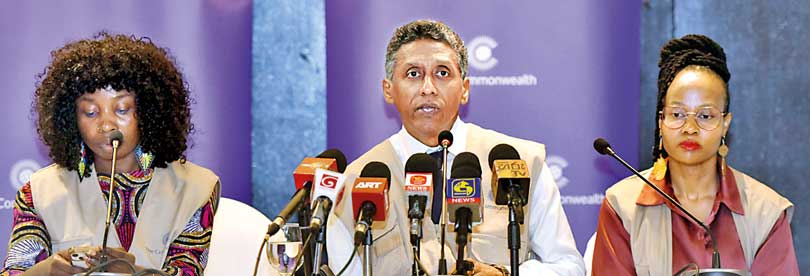Monday Feb 16, 2026
Monday Feb 16, 2026
Tuesday, 24 September 2024 01:37 - - {{hitsCtrl.values.hits}}

Commonwealth Secretariat Temi Kalejaiye (left), Commonwealth Observation Group Chairperson Danny Faure, and Commonwealth Secretariat Lindiwe Maleleka at the press briefing in Colombo yesterday – Pic by Ruwan Walpola
By Michelle Therese Alles
The Commonwealth Observer Group yesterday shared its preliminary assessment of Sri Lanka’s 2024 Presidential election saying it has been deemed peaceful, but noted that some voters and polling staff did not appear to fully understand the preferential system of voting.
Led by a delegation of 14 independent experts, the Commonwealth’s mission arrived in Sri Lanka on 14 September following an invitation from the Election Commission of Sri Lanka. The team will conclude its observations on 27 September.
This marks the Commonwealth’s 200th election observation since the initiative began in 1980. The observers, who specialise in areas such as law, politics, elections, gender, youth, and media, remain independent of the Commonwealth Secretariat.
Their role is to provide an impartial, informed analysis of the electoral process, assessing factors that could affect the credibility and transparency of the election. Observers were deployed across all nine provinces of Sri Lanka and engaged with Government officials, political parties, civil society organisations (CSOs), and international observers.
Ahead of the election, the Commonwealth Observer Group met with the Election Commission of Sri Lanka, political party representatives, law enforcement, media outlets, and citizen observers.
The Election Commission was praised for introducing reforms aimed at enhancing accessibility, such as the introduction of tactile stencils for visually impaired voters, sign language at polling stations, and identification cards for Persons with Disabilities (PWDs). The newly-implemented Regulation of Elections Expenditure Act (No. 3, 2023) was also highlighted, though concerns were raised regarding the Commission’s capacity to enforce it.
While the election saw improvements in voter education and awareness, the Group noted a need for more comprehensive educational programs on the preferential voting system. Media freedom was largely respected, though media ownership continues to influence election coverage. Additionally, concerns were raised about the misuse of social media, with issues of misinformation and disinformation being addressed in partnership with CSOs.
The campaign period was largely peaceful, though allegations of State resource misuse and isolated incidents of physical and online intimidation were reported. On Election Day, polling stations opened on time, and the pre-poll and opening procedures were conducted in an orderly manner. The Commonwealth observers noted a peaceful atmosphere throughout the voting process, with polling officials demonstrating professionalism and transparency.
Polling stations were well-organised, with the elderly and PWDs given priority. The use of tactile frames for visually impaired voters was observed in some stations. However, the Group noted that female representation was limited, with no female Presidential candidates and a predominantly male presence in senior polling roles.
The secrecy of the ballot was compromised in some locations due to inconsistent polling station layouts. The presence of police was observed at all polling stations, where they acted professionally, ensuring security. The Group observed the closing of polls and the counting of votes. While the process was managed efficiently, there was a lack of understanding of the preferential voting system among both voters and counting staff, resulting in some ballots being incorrectly marked. The Group will include recommendations for improving the voting process in their final report. The Commonwealth Observer Group concluded that the election was conducted in a credible and transparent manner. The Group praised the people of Sri Lanka for turning out peacefully on International Peace Day to exercise their right to vote.
The Group’s final report, including key recommendations, will be shared with the Commonwealth Secretary-General, the Government of Sri Lanka, and other key stakeholders.